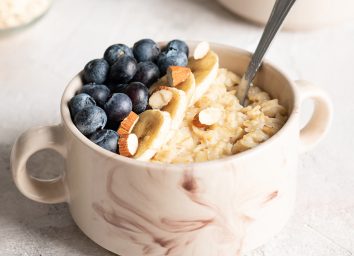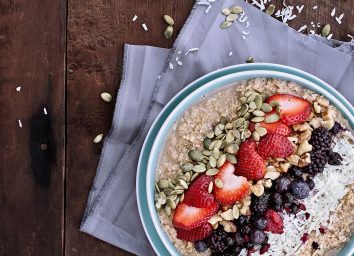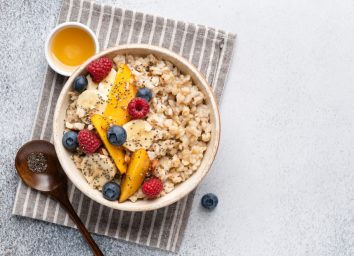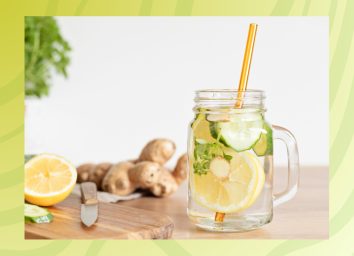10 Oatmeal Recipes to Help Lower Cholesterol
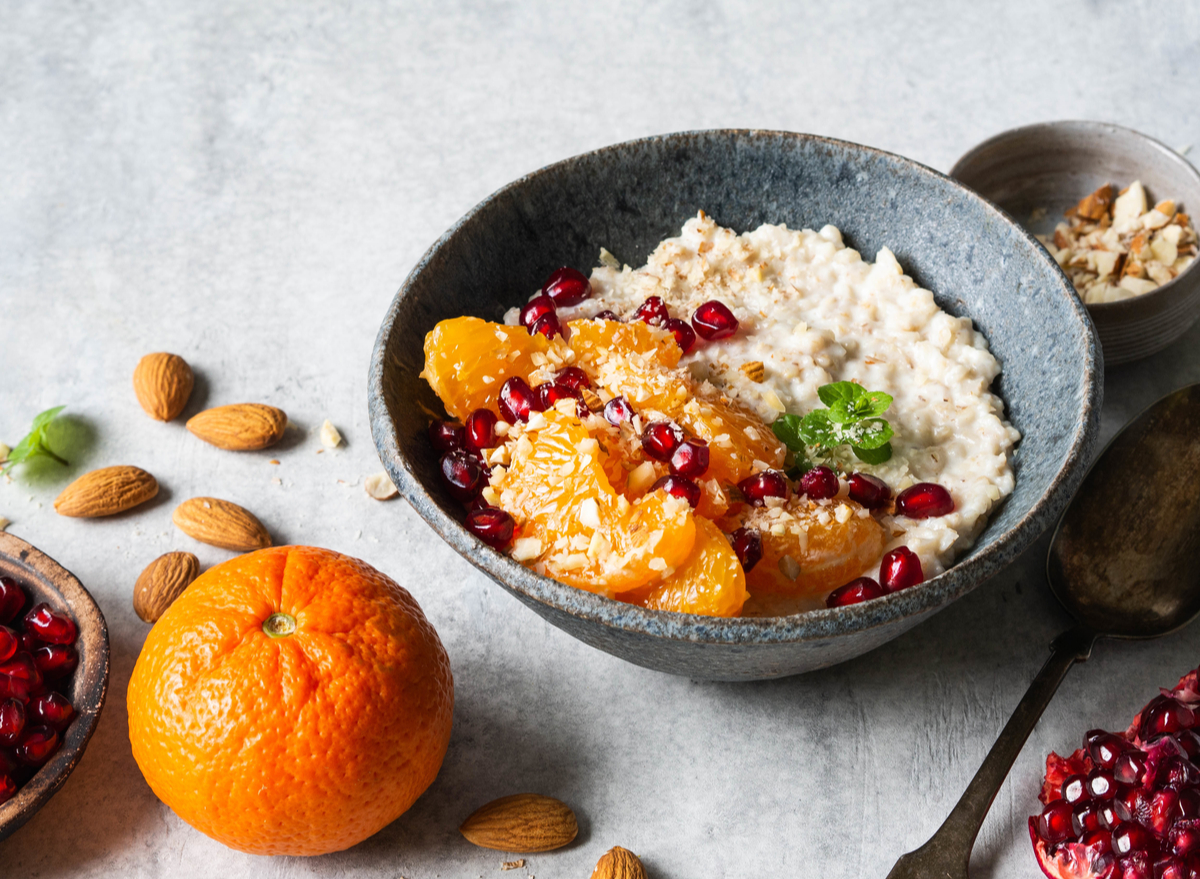
Oatmeal is one of the best cholesterol-lowering breakfast foods out there, mainly thanks to the health benefits that oats have to offer. In fact, eating a hearty bowl of oats may quite literally reduce LDL "bad" cholesterol and improve other markers of cardiovascular disease (CVD) risk, making it a cholesterol-improving superstar.
Among the sea of good-for-you nutrients that this dish provides–including B vitamins, iron, and magnesium–oats contain a unique soluble fiber called beta-glucans. This soluble fiber is associated with enhancing the removal of bile acids and cholesterol from the body, resulting in lowered cholesterol levels.
The evidence surrounding the benefit of oat beta-glucans on cholesterol is so strong that the US Food and Drug Administration (FDA) authorized the use of a heart health claim whenever oats are used in a food. Specifically, this health claim highlights how consuming at least 3 grams of beta-glucans every day may have cholesterol-lowering properties.
Bottom line? Oats are a powerhouse when it comes to supporting healthy cholesterol levels. And to make matters even better, you can add ingredients to your cozy bowl of oatmeal that complements the cholesterol-lowering benefits of the oats and make this dish even more heart-healthy.
From walnuts to blueberries to even interesting spices like turmeric, the oatmeal add-in options are endless. Among the sea of ingredient choices out there, here are 10 delicious ingredient combos to help get you going on your cholesterol-lowering journey. Read on, and for more on how to eat healthy, make sure to read up on these Surefire Ways to Lower Your Cholesterol, Say Dietitians.
Raisin Walnut Oatmeal
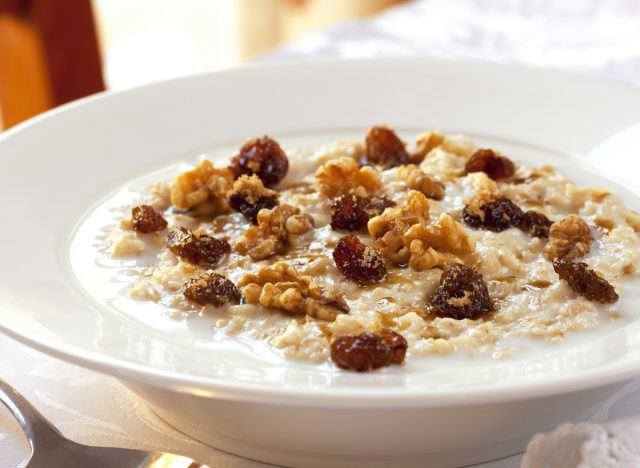
Topping your oatmeal with walnuts and raisins may sound pretty basic, but there is something to this classic oat-topping combo when it comes to supporting healthy cholesterol levels.
In a recent study evaluating healthy elders, those who included a daily dose of walnuts in their diet (around 14-24 halves) experienced a reduction in about 4.3 milligrams per deciliter of LDL ("bad") cholesterol reduction. Those with a diagnosis of high cholesterol experienced more benefits from the walnuts vs. those who had healthy cholesterol levels at the beginning of the study.
And raisins, being a natural source of fiber and potassium with no added sugars, is a natural choice when a little sweetness is needed along with cholesterol-lowering nutrients.
Topping your oatmeal with this classic duo may not be the most exciting choice, but it is effective and totally simple to do. And it may be the hack that your body needs to help keep your cholesterol levels in check.
Blueberry Maple Oatmeal
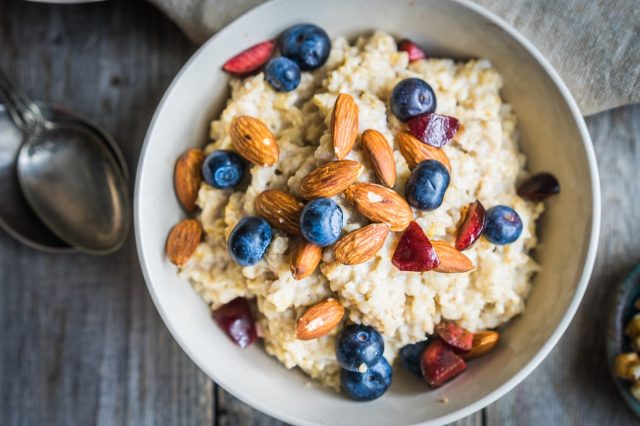
Topping your oatmeal with fresh or frozen blueberries and a drizzle of pure maple syrup can be just what the doctor ordered when it comes to your heart health.
Blueberries add a natural sweetness to your oats along with natural fiber, vitamins, minerals, and polyphenols that have been shown to help keep your heart health in tip-top shape. And according to the results of a study published in the American Journal of Clinical Nutrition, people with metabolic syndrome who consumed the equivalent of one cup of fresh blueberries daily showed positive outcomes when it comes to heart health, including increased HDL "good" cholesterol levels.
While people who are focused on lowering their cholesterol shouldn't include too many added sugars in their diet, a small addition of pure maple syrup can add some much-needed flavor along with some natural antioxidants. Specifically, a unique molecule called quebecol found in 100% pure maple syrup from Canada, has anti-inflammatory properties. Since higher levels of a marker of inflammation are linked to a lower level of HDL ("good") cholesterol, finding ways to manage inflammation in a natural way, like by leaving on pure maple syrup from Canada instead of refined sugar, may help the overall picture of cardiac health.
PB and J Oatmeal
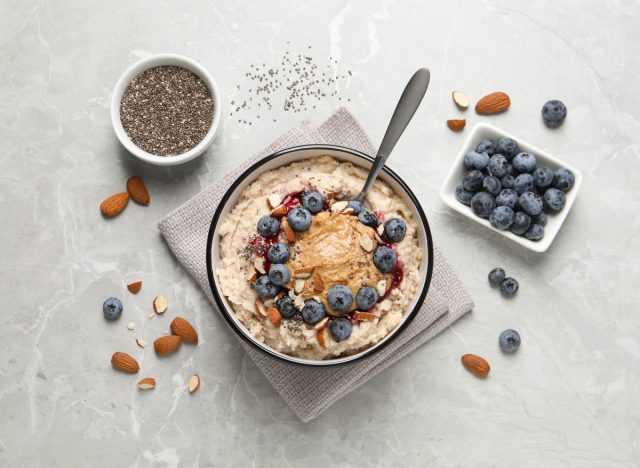
That beloved combo of peanut butter and jelly doesn't have to be reserved for just sandwiches. Including a tablespoon of natural peanut butter (chunky or creamy will work) and fresh or frozen berries will give you that nostalgic taste along with some heart-health benefits. Using berries instead of jellies with added sugars can help give your body natural antioxidants, vitamins, and minerals that may support healthy cholesterol levels. And peanut butter, a cholesterol-free plant-based protein source, has been shown to lower total cholesterol and triacylglycerol concentrations in certain populations, making it an ideal addition to your breakfast dish.
Strawberry Chocolate Oatmeal
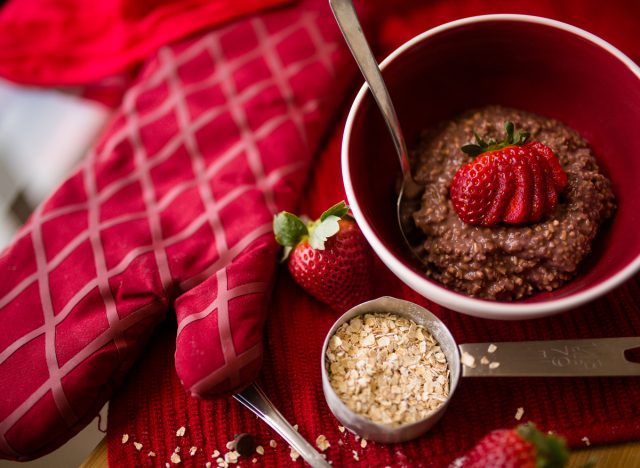
Just because you are a chocolate lover, it doesn't mean that you have to do without your beloved flavor if you are trying to support healthy cholesterol levels. In fact, eating cocoa products like dark chocolate can help lower LDL and total cholesterol levels, according to a meta-analysis published in the European Journal of Clinical Nutrition, which is why you should consider mixing some cocoa powder and dark chocolate chips into a decadent, good-for-you oatmeal.
Combining fresh or frozen strawberries with chocolate is a natural choice, as chocolate-dipped strawberries are a beloved treat that practically everyone with taste buds loves. Plus, the antioxidants, fiber, and phytochemicals in strawberries have been shown to reduce total cholesterol levels.
Pear Cinnamon Oatmeal
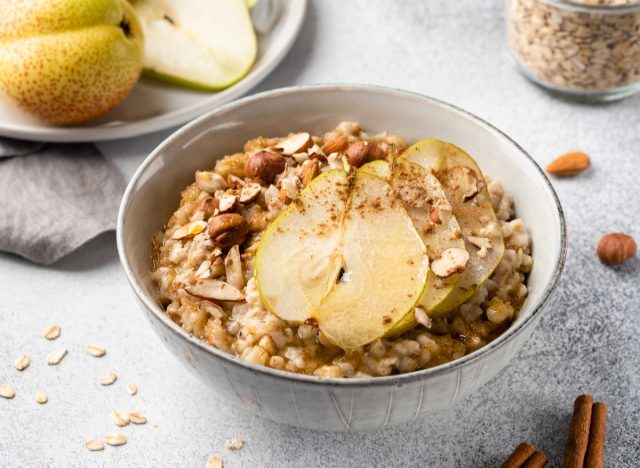
Cinnamon is a go-to spice that belongs in many oatmeal recipes. But adding this flavoring may offer some cholesterol-lowering benefits too. While the amount of cinnamon that you add to your oatmeal may not be enough to have a true effect on your cholesterol levels, adding some to your morning oats can give you a head-start to meet your daily quota throughout the day.
And chopped pears (with the skin still on) simmered in water and cinnamon can be a heart-healthy addition that adds a cozy touch to many recipes, including oatmeal, as daily fresh pear consumption may promote improvements in cardiometabolic health in middle-aged and older adults with metabolic syndrome.
Citrus-Infused Oatmeal
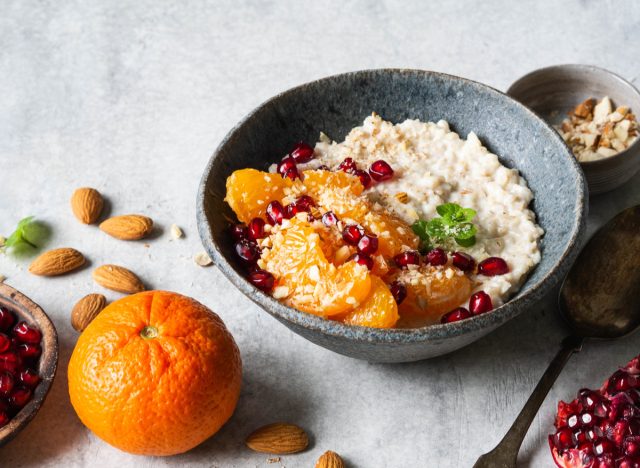
A glass of 100% orange juice is a cholesterol-lowering powerhouse, as data shows drinking 750 milliliters (or a little over a cup) of this natural juice every day for 8 weeks may reduce LDL cholesterol levels in both normal and overweight people.
Instead of drinking your OJ, why not eat it? Using 100% orange juice in your oatmeal recipes gives your dish a nice citrusy taste along with a heart-healthy bonus. Simply boil 1 cup of quick cook oats with 1 cup of OJ and 1 ½ cup of water. Top your oats with pomegranate arils, slivered almonds, and a pinch of cinnamon for a breakfast that is anything but ordinary.
Turmeric Oatmeal
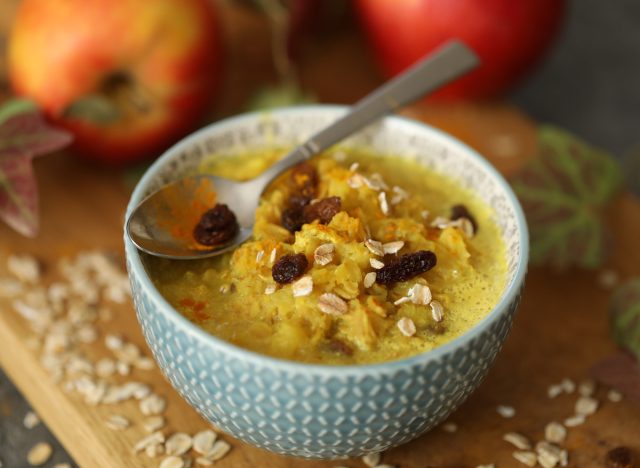
If you haven't hopped on the turmeric train yet, this oatmeal recipe idea may just be the thing to hop on board. According to the results of a meta-analysis of randomized control trials that were published in Nutrition Journal, turmeric supplementation is linked to a reduction in LDL and triglyceride levels among people at risk for cardiovascular disease. While you may not be able to sneak a clinical dose of turmeric into your bowl of oatmeal, getting some of this spice certainly won't cause harm to your heart health.
To make turmeric oats (AKA golden oats), simply add 1 teaspoon of ground turmeric to your already made oatmeal and enjoy!
Powerhouse Oatmeal
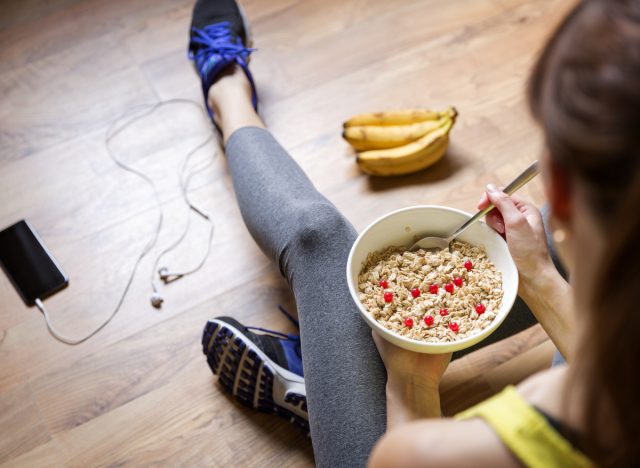
The secret ingredient to an oatmeal that gives you some staying power along with cholesterol-lowering benefits is mashed garbanzo beans. In fact, after evaluating 26 randomized controlled trials that involved pulses consumption (including chickpeas), results showed that including these foods can significantly reduce LDL cholesterol levels.
To make a powerhouse oatmeal, simply add ¼ cup of washed, rinsed, and mashed chickpeas to your oatmeal and top it with whichever good-for-you toppings you like. Not only will you get heart-health benefits, but you will also get a boost of fiber and protein to help keep you satisfied until lunchtime.
Acai Berry Oatmeal
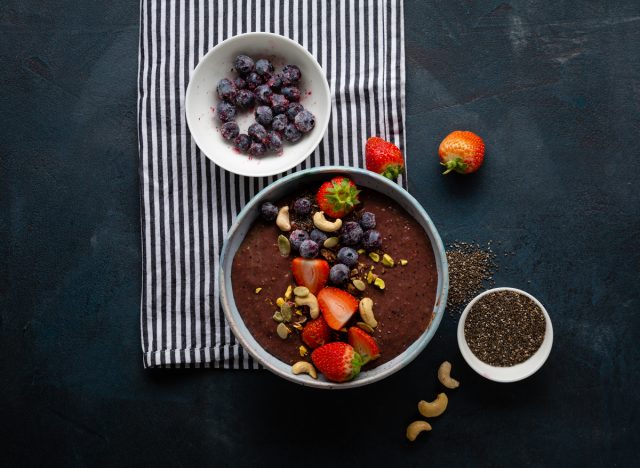
We all know (and love) a classic acai bowl on a warm summer day. But when the weather dips, the last thing we want is an icy and fruity bowl to start our morning.
You can still enjoy the taste and benefits of acai while also scarfing down a cozy bowl of oatmeal. Since acai has favorable effects on plasma HDL metabolism, cutting this berry out of your diet during the chilly season would be a shame.
Adding some acai powder or thawed acai puree to your oatmeal will result in a gorgeous-colored bowl of goodness that is loaded with antioxidants. Top with fresh fruit and a dollop of natural nut butter for an acai bowl-like breakfast that is a bit more stick-to-your-ribs for the wintertime.
Savory Mushroom Oatmeal
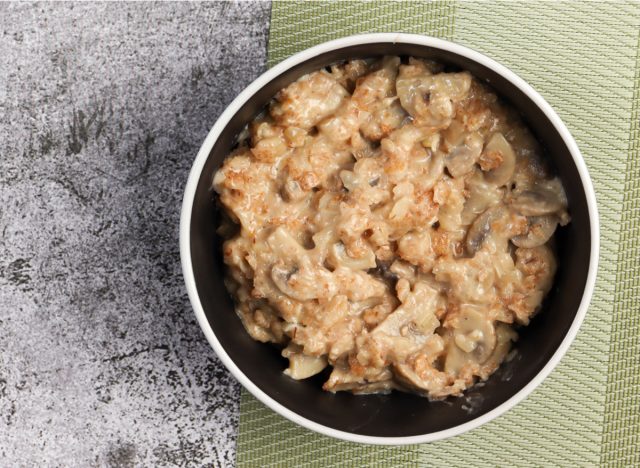
Oatmeal doesn't have to be just for breakfast. Savory oatmeal can be super-satisfying and can help you get important nutrients in your diet, especially if you aren't a breakfast eater.
Savory mushroom oatmeal is equally nutritious and delicious. And thanks to the addition of mushrooms, you will get a double dose of those cholesterol-lowering beta-glucans, as mushrooms naturally contain this same fiber as oats do.
To make savory mushroom oatmeal, cook your oats in chicken broth instead of water, and stir in sautéed mushrooms, onions, garlic, and spinach. Top the dish with some fresh parmesan cheese and enjoy your simple and veggie-rich dinner!
Read these next:
